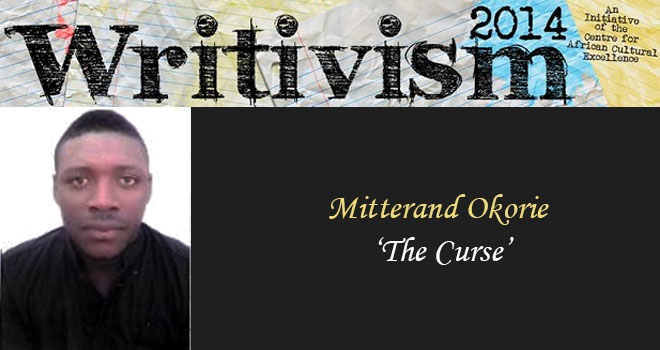The Curse
No one cried. Not even a whimper. When news of his demise was heard around the community, no one gave a fuck. There were lots of things to cry about, why waste tears over a boy whose audacity frightened even the devil?
Uzondu assigned himself the task of ridding the community of its livestock. And while complaints of missing cockerels mounted, he busied himself preparing roasted chicken every day.
You are roasting yet another fowl today? I hope you are not responsible for all the missing chickens in this community.
Papa, is your own fowl missing? Can one no longer eat chicken in this house without being suspected of stealing it? He questioned, scowling at the old man.
The man looked at him, convinced Uzondu had stolen again. His notoriety shattered him and he knew that one day, luck would run out, and he would become the disgraced father of a criminal. But even then, the worst was yet to come.
Uzondu began to use fetish charms. When questioned, he said they were to protect himself from enemies. But when his mother insisted that he should name them, he asked her not to worry, that the charms were simply meant to protect him against machete cuts or from harm when he got into a fight.
You mean, from those whose goats and fowls you must have stolen? His father interjected.
The boy has a good reason, leave him alone, his mother replied, hissing and turning away.
You see a lizard hanging on a tree, yet you ask if the animal is endowed with the gift of climbing! Woman, advice your son! Ozondu’s father warned his wife.
Uzondu did not stop stealing and amassing charms. He got himself a virulent charm aptly named Touch-and-Follow, which had the power to compel any girl to follow him when he touched her. He used it to touch Adanna, the one girl who did not want anything to do with him.
Is your Mother around?
What are you doing in my house Uzondu? Adanna replied.
And that was the last thing she could remember before he touched her. Every other event, speech, action became a cluster of disjointed and blurry events. She could barely recount her ordeal, she forgot what she was about to say before she could begin speaking, each thought erased from her mind as it formed.
She only remembered snapping in and out of consciousness, and battling to shove aside a figure moving in a zigzag manner around her. It pounded against her naked body with the impetus of a raging bull, thrusting brashly and hastily. She felt sharp, deep, and burning pains but soon she was enveloped in blackness again. Unconscious, she lay there till her mum woke her up, in tears. And when she fixed her gaze down the sheets, her heart bleed, she had been raped. Her mum held her to her bosom, and both were overwhelmed with grief and anger.
Uzondu, Mama. It was Uzondu. Adanna stammered, choking on her sobs.
But he denied ever setting feet upon that house, even swore in God’s name, dipping his index finger in the sand and touching the tip of his tongue while doing so.
Does this not belong to you? Is this not your name and house number on it on this receipt? He was shocked beyond belief; unable to imagine how he failed to notice something fell off his pocket while removing his pants. But like the devil himself, he made a twisted comeback.
Yes. I was at your house, but it was Adanna that asked me to come and do it to her. Adanna, who stood beside her mother, with clothes that still bore traces of Uzondu’s crime, lifted up her head, looked straight into his eyes and said: For what you did to me, you won’t survive your next crime.
When the crowd had disappeared, Uzondu’s father stared at him, and although frozen by shame, still had words for him. Your grandmother was right, he said, before walking away.
After his birth, when his grandmother hoisted him against the ray of the sun, staring keenly at his countenance, she told his father: The boy isn’t yours.
But he never told his wife about it. They had spent a decade looking for a child; he was not ready to taint her joy nor his, not on that day, not ever. It’s a secret he planned to take to the grave. But now he saw what his mother had seen the day he was born. The boy was indeed nothing like him nor his wife.
Early one morning, the accursed Uzondu met his waterloo. The village hunter had seen a stout, dark figure, curled up at the base of a yam plant. He took aim, fired a shot, and then heard a loud and anguished human scream. Anwuola m o! Anwuola m o!
People began to troop out of their homes to see who was dying. The hunter had his gun on the ground and his hands on his head.
I thought it was a porcupine, he repeatedly told the crowd. I thought it was a porcupine I swear.
Uzondu lay there, bleeding away. He had been harvesting yams in a farm that belonged to someone else. He gasped for breathe, asked for water, and then breathed his last.
There was no mournful wailing, no tears; just sighs and shrugs of indifference. Everyone marched away from where Uzondu lay in a pool of his congealing blood, not with a sense of loss, but one of relief. They felt his atrocities against the land could only be cleansed by his own blood. His death; a debt he owed the community which he had so callously beleaguered.
*End*
This is one of the stories that came out of the Writivism 2014, a project of the Centre for African Cultural Excellence, with the assistance of several partner organisations, which identifies, trains and engages readers and writers in public discourse through literature. Like the Facebook page for more updates





